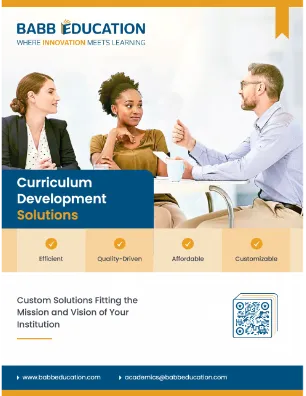Traditional assessments like multiple-choice tests and essays may not fully capture student learning in online environments.
Traditional assessments like multiple-choice tests and essays may not fully capture student learning in online environments. Therefore, educators must explore and implement creative assessment techniques designed to align with the dynamic nature of online learning and promote higher-order thinking skills in their students.
Read on to explore several innovative techniques for online course assessments, leveraging technology to enhance learning outcomes and provide a more comprehensive understanding of student progress.
The Importance of Innovative Assessments
The role of assessment in education is multifaceted as it serves not only to evaluate student learning but also to guide instructional decisions and provide feedback to learners. In online courses, innovative assessments can:
- Encourage Active Learning: Engaging students actively in their learning process enhances understanding and retention.
- Foster Critical Thinking: Designing innovative assessments can promote deeper learning by challenging students to apply, analyze, evaluate, and synthesize information.
- Accommodate Diverse Learning Styles: Utilizing various assessment methods allows educators to cater to different learner preferences and needs.
Innovative Assessment Techniques
Incorporating innovative assessment techniques requires an understanding of educational theories and principles. Constructivist theories, which emphasize active learning and real-world application of knowledge, provide a strong foundation for designing these assessments. Here are a few examples:
Project-Based Assessments
Project-based assessments involve students working on complex tasks resembling real-world problems, allowing them to apply their knowledge in practical scenarios. These assessments can be designed as group projects which encourage collaboration and communication. An example of this type of assessment in a business course could be an assignment for which students develop a marketing strategy for a company, incorporating market research, data analysis, and creativity.
Peer Assessment
Peer assessments allow students to evaluate each other's work, fostering a collaborative learning environment. This technique encourages students to engage critically with course material, develop evaluative skills, and refine their communication skills. Providing clear rubrics and guidelines for students helps to ensure constructive feedback and consistency in evaluations.
e-Portfolios
e-Portfolios are digital collections of student work that showcase their learning progress and achievements over time. They provide a holistic view of student learning and are especially effective for courses that emphasize skill development. e-Portfolios allow students to reflect on their learning journey and demonstrate their abilities to potential employers.
Simulations and Virtual Labs
Simulations and virtual labs offer students hands-on experience in a controlled digital environment. These assessments are particularly useful in STEM fields, where practical application of concepts is crucial. An example of this in a chemistry course could include a virtual lab in which students conduct experiments and analyze results, enhancing their understanding of complex scientific concepts.
Gamified Assessments
Gamification involves incorporating game elements into assessments, such as points, badges, and leaderboards, to motivate and engage students. This approach can make learning more enjoyable and promote healthy competition. Be mindful of ensuring the gamified elements align with learning objectives and do not overshadow educational goals.
Scenario-Based Assessments
Scenario-based assessments present students with realistic scenarios where they must apply their knowledge and skills to solve problems. This technique is effective in developing critical thinking and decision-making skills. For example, in a nursing course, students could be presented with a patient case study and asked to develop a care plan based on the provided information.
Designing Effective Online Assessments
To design effective online assessments, educators should consider the following principles:
Alignment with Learning Objectives
Ensure assessments align with the course's learning objectives. Every assessment should have a clear purpose and contribute to achieving the desired learning outcomes.
Variety and Flexibility
Incorporate a variety of assessment methods to accommodate diverse learning styles and preferences. Providing options for students can enhance engagement and motivation.
Authentic and Relevant Tasks
Design assessments that are both authentic and relevant to real-world applications. This approach allows an instructor to increase the value of assessments and helps students understand the practical implications of their learning.
Feedback and Reflection
Provide timely and constructive feedback to students and encourage them to reflect on their performance to make improvements. Remind them that self-assessment and reflection are important components of a meaningful learning process.
Challenges and Considerations
While innovative assessments offer numerous benefits, educators must also be mindful of potential challenges such as:
- Technology Access: Ensure all students have access to the necessary technology and resources to complete assessments.
- Academic Integrity: Develop strategies to maintain academic integrity in online assessments, such as using plagiarism detection tools and designing open-ended tasks.
- Scalability: Consider the scalability of assessments, especially in large courses. Tools like automated grading systems and peer assessment can help manage workload.
Innovative techniques for online course assessments offer educators new opportunities to enhance student learning and engagement. By incorporating diverse and creative assessment methods, educators can better evaluate student progress and foster the development of critical thinking and problem-solving skills. As the field of online education continues to grow, staying informed about the latest trends and technologies is essential for designing effective and meaningful assessments.
Incorporating these innovative techniques requires a shift in mindset and a commitment to ongoing professional development. Educators must be willing to experiment with new methods and continuously refine their assessment strategies to meet the evolving needs of their students.
As you consider integrating these techniques into your online courses, reflect on the following questions:
- How can you align your assessments with the course's learning objectives?
- What strategies can you use to promote academic integrity in online assessments?
- How can you incorporate student feedback to improve your assessment practices?
Contact Babb Education today for more information about how we can work with you to create more engaging and effective assessment experiences for your students!


